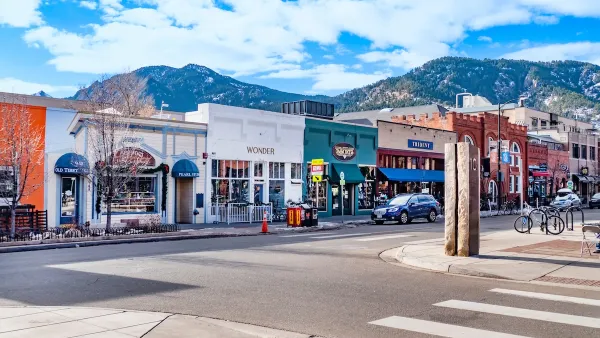Having stalled in the state Senate last June, a bill that aims to "reduc(e) governmental or government-required subsidies for parking" passed out of the senate on Jan. 28. Parking strategies would be eligible for cap & trade credits under the bill.
The bill focuses on providing incentives for municipalities to reduce subsidies to parking, including reducing or eliminating 'minimum parking requirements'. Funding of 'transportation demand management' measures would be available from the Highway Users Account.
For more specifics, see the Jan. 27 legislative analysis.
The bill is opposed by the influential League of CA Cities, California State Association of Counties, and California Building Association.
"Free parking has significant social, economic and environmental costs," (State Senator) Lowenthal said. "It increases congestion and greenhouse gas emissions."
"Republicans opposed the measure, saying the Legislature should not be meddling in how much people pay to park.
The bill, supported by the Natural Resources Defense Council (NRDC, also the bill sponsor) and the Sierra Club, provides financial incentives for cities and counties to stop providing free parking on the street and at government offices and to reduce the amount they require businesses to provide.
When a store provides free parking, the cost to maintain, clean, insure, secure and light the parking lot is passed on to shoppers in higher prices for goods, said Justin Horner, an analyst with the NRDC. Free street parking is paid for by the entire community in the form of higher taxes, he said."
Thanks to Roundup
FULL STORY: State lawmakers take aim at free parking

Maui's Vacation Rental Debate Turns Ugly
Verbal attacks, misinformation campaigns and fistfights plague a high-stakes debate to convert thousands of vacation rentals into long-term housing.

Planetizen Federal Action Tracker
A weekly monitor of how Trump’s orders and actions are impacting planners and planning in America.

In Urban Planning, AI Prompting Could be the New Design Thinking
Creativity has long been key to great urban design. What if we see AI as our new creative partner?

King County Supportive Housing Program Offers Hope for Unhoused Residents
The county is taking a ‘Housing First’ approach that prioritizes getting people into housing, then offering wraparound supportive services.

Researchers Use AI to Get Clearer Picture of US Housing
Analysts are using artificial intelligence to supercharge their research by allowing them to comb through data faster. Though these AI tools can be error prone, they save time and housing researchers are optimistic about the future.

Making Shared Micromobility More Inclusive
Cities and shared mobility system operators can do more to include people with disabilities in planning and operations, per a new report.
Urban Design for Planners 1: Software Tools
This six-course series explores essential urban design concepts using open source software and equips planners with the tools they need to participate fully in the urban design process.
Planning for Universal Design
Learn the tools for implementing Universal Design in planning regulations.
planning NEXT
Appalachian Highlands Housing Partners
Mpact (founded as Rail~Volution)
City of Camden Redevelopment Agency
City of Astoria
City of Portland
City of Laramie





























